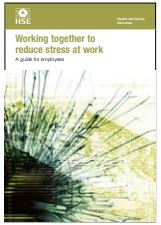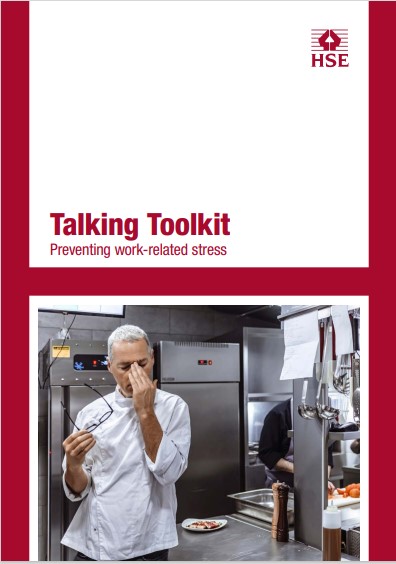Stress
Stress can be defined as "The adverse reaction people have to excessive pressures or other types of demand placed on them."
These excessive pressures can come from either one main or many differing sources. When a person feels that they cannot cope with the pressures, and there is a resulting adverse impact on their performance or ability to cope, then it can be said that stress occurs. Prolonged or repeated periods of such pressure can lead to stress related illnesses such as depression or anxiety.
Controlling pressure and preventing stress related illnesses in the workplace is a two way process, requiring cooperation between managers and employees, as neither is likely to be able to resolve a situation on their own. However, by working together and, where necessary with the support of Human Resources, the optimum resolutions can be found. See also "Guidance on how to deal with instances of stress".
The University has a range of policies, procedures and guidance that are designed to tackle various issues that can have an impact on stress and work-related stressors:
- The University Employee Assistance Programme is available for any member of staff struggling with pressure or stress related illnesses, whether work related or not.
- The University of Warwick Stress Policy (see link on right hand side of page), which defines how work-related stress is managed and what actions can be taken to prevent stress at work, and the Stress Management Review Questionnaire can be used by an individual and their line manager/HR Adviser when they are struggling with a stress related matter or when they return to work after a stress-related absence. There is also guidance on how to complete the Stress Management Review Questionnaire on the right-hand side of this page and a Word version of the questionnaire should the form need to be completed electronically or if more space is required to enter comments. Additional sheets may also be used.
- A risk assessment of potential stress factors within a department (i.e. factors not specific to an individual) should be carried out by departmental managers using the Stress Risk Assessment Form, which is based on the HSE's Stress Management Standards. This is a specialist risk assessment and is available on the right-hand side of this page.
- Annual ReviewLink opens in a new window: Every member of staff is entitled to an Annual Review with their line manager. This provides an opportunity to discuss achievements, career aspirations, objectives for the coming year and development needs as well as any issues being experienced by the individual. The Talking Toolkit produced by the HSE (see document linked on the right-hand side of this page) may be useful to read in advance of any member of staff's annual review. Whilst there should be multiple opportunities to raise issues with a line manager, the annual review does provide a good opportunity, if there has not been opportunity to do this beforehand.
- Our 'Dignity PrinciplesLink opens in a new window': Set out our expectations of how we behave as a community, both as individuals and as an institution, and inform our approach to taking appropriate action when these expectations are not met. These principles facilitate an environment with the ability to voice ideas at its core, a place in which staff and students operate with mutual respect, with the confidence that equality of opportunity is accessible to all. Dignity can be defined in many ways, for example, being valued and respected, an acknowledgement of our equal worth as human beings.
- Management of PerformanceLink opens in a new window: This procedure aims to support individuals to reach their full potential within their roles. It provides a framework for managing those whose performance does not reach, or has fallen below, the standard expected. The aim is to provide whatever coaching, training, guidance and support necessary to enable individuals to achieve and maintain a good, or higher level, of performance and to provide managers with guidance and support in such circumstances.
- Sickness ManagementLink opens in a new window: This policy and other procedures related to sickness absence aim to promote a positive attitude to minimise absence from work and raise awareness of the effects of sickness absence on colleagues and service delivery.
- Grievance ProcedureLink opens in a new window: Provides a framework for the consideration of grievances in a fair, consistent, timely and effective manner. Grievances are concerns, problems or complaints that employees raise with their employer. Employees are encouraged to carefully consider the nature of their grievance and wherever possible to explore resolution informally prior to commencing the formal procedure.
There are also a range of other sources of support:
1. Leadership and Management DevelopmentLink opens in a new window provide a portfolio of training and self-development courses that are relevant for managing the risks of stress including, but not limited to: Assert Yourself, Handling Difficult Conversations, Making teams work, Stress Less, Doing the Right Thing, and Managing the Stress, as well as Coaching & MentoringLink opens in a new window. There are also a selection of video resources on the Leadership & Management Development webpagesLink opens in a new window available to you. There are also a number of programmes and short courses, which are available for new and existing managers: Programmes and Short Courses (warwick.ac.uk)
2. Internal Support Services - e.g. Occupational HealthLink opens in a new window, Human ResourcesLink opens in a new window, Staff & Student WellbeingLink opens in a new window including the Staff Wellbeing HubLink opens in a new window, Report & Support, including link to associated ResourcesLink opens in a new window, and Trade Union representativesLink opens in a new window.
3. External Support Services - e.g. the University's Employee Assistance Programme (see right-hand webpage link), General Practitioners, specific counselling services (CALMLink opens in a new window, CruseLink opens in a new window (Bereavement Support), RelateLink opens in a new window, MindLink opens in a new window, SamaritansLink opens in a new window).
Internal Links
Stress PolicyLink opens in a new window
Stress Risk Assessment FormLink opens in a new window
Completion of this questionnaire is recommended when a stress related issue has arisen and must be completed when a member of staff returns to work after a stress-related absence
Stress Management Review Questionnaire (Word version)Link opens in a new window
Leadership & Managment DevelopmentLink opens in a new window
University Dignity PrinciplesLink opens in a new window
External Links
Click the image above to download HSE's 'Working together to reduce stress'


